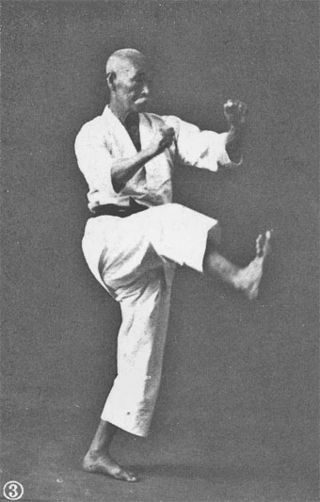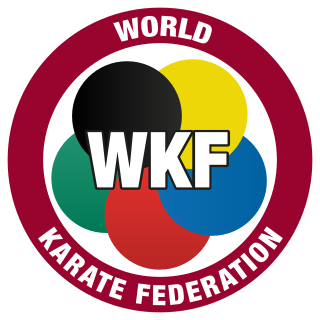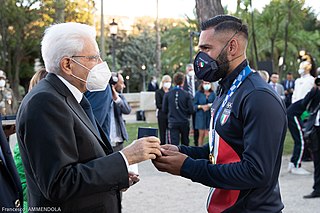
Karate (空手), also karate-do, is a martial art developed in the Ryukyu Kingdom. It developed from the indigenous Ryukyuan martial arts under the influence of Chinese martial arts. While modern karate is primarily a striking art that uses punches and kicks, traditional karate training also employs throwing and joint locking techniques. A karate practitioner is called a karate-ka (空手家).

Shotokan is a style of karate, developed from various martial arts by Gichin Funakoshi (1868–1957) and his son Gigo (Yoshitaka) Funakoshi (1906–1945). Gichin Funakoshi was born in Okinawa and is widely credited with popularizing "karate do" through a series of public demonstrations, and by promoting the development of university karate clubs, including those at Keio, Waseda, Hitotsubashi (Shodai), Takushoku, Chuo, Gakushuin, and Hosei.

Kumite is one of the three main sections of karate training, along with kata and kihon. Kumite is the part of karate in which a person trains against an adversary.

The World Karate Federation (WKF) is an international governing body of sport karate with 198 member countries. It is the only karate organization recognised by the International Olympic Committee and has more than a hundred million members. The WKF organizes their Junior and Senior Karate World Championships, which are each held every other year. The President of the WKF is Antonio Espinós, and the headquarters are located in Madrid, Spain.
Hirokazu Kanazawa was a Japanese master of Shotokan karate. He was the Chief instructor and President of the Shotokan Karate-Do International Federation, an organisation he founded after he left the Japan Karate Association (JKA). Kanazawa was ranked 10th dan in Shotokan Karate.

The Japan Karate Federation (JKF), a.k.a. Japan Karatedo Federation, is a national governing body of the sport karate in Japan. The JKF is officially affiliated with the Japan Olympic Association (JOC), World Karate Federation (WKF), Japan Sports Association (JSA), and Japanese Budō Association (JBA). The styles recognized by the JKF are Gōjū-ryū, Shitō-ryū, Shotokan, and Wadō-ryū. Its headquarter is located in Tokyo, Japan.
The Karate World Championships, also known as the World Karate Championships, are the highest level of competition for karate organized by the World Karate Federation (WKF). The competition is held in a different city every two years. Championships in the 2000s included Madrid in 2002, Monterrey in 2004, Tampere in 2006, Tokyo in 2008, and Belgrade in 2010. The competition was initially riddled with controversy regarding karate styles and the ruleset.

Arnela Odžaković is a Bosnian karateka and sportswoman of the year in 2007.
The Trinidad and Tobago Karate Union (TTKU) is the National Governing Body for the sport of Karate in Trinidad and Tobago. The TTKU is affiliated to the World Karate Federation (WKF) which is the only world karate organization recognised by the International Olympic Committee.

Paul Noel Starling is an Australian martial artist renowned as a Gōjū-ryū Karate master. He was the most senior Caucasian student of Gōjū-ryū Gogen Yamaguchi, and is a world Vice President of the International Karate do Goju Kai Association (IKGA)
Atsuko Wakai is a Japanese practitioner of karate who has won many international and Japanese national competitions in kata (patterns), including unprecedented numbers of consecutive titles in World Karate Federation (WKF) and All Japan Karatedo championships. She holds the rank of 6th dan black belt from the Japan Karatedo Federation (JKF), training in Seigokan Goju-ryu karate.
USA National Karate-do Federation is the national governing body (NGB) of karate for the United States Olympic Committee and as such is the official Member National Association (MNA) of the World Karate Federation (WKF) in the United States.
Zeki Demir is a European champion Turkish karateka competing in the kumite -80 kg division. He is a member of the İstanbul Büyükşehir Belediyesi S.K.
Luis Manuel Plumacher is WKF world champion from Venezuela. Aside from winning a world championship in 2004, Luis Plumacher was also a silver medalist in 2006, and in the World Games in 2005. Plumacher was part of the Venezuelan National karate team for 10 years, from 2000 to 2010. During these years he was quite a prolific international medalist. Plumacher kept a very high performance during his competitive years, which made him achieve a reputation as the best fighter on his division, and leading him to 2 World finals, earning him a spot as one of the best world fighters in karate-do competitions.

Mikio Yahara is a Japanese karate expert of the Shotokan style. He holds the rank of 10th dan.

John Fonseca is a former American karateka most known for being the first karate athlete in the world to win repeat gold medals at the Pan American Games, first American to medal at the Karate World Championships in almost 16 years (kumite), and first American to win the Paris Open in more than 30 years.

Karin Prinsloo is a South African karateka, gold medal winner of the 6th World Games (2001) in the under 60 kg Kumite category and Karate instructor formerly based in Durban, South Africa, now living in Perth, Australia. She is listed among the top Karate competitors of all time.

Luigi Busà is an Italian karateka. He is a two-time gold medalist at the World Karate Championships and a five-time gold medalist at the European Karate Championships. He represented Italy at the 2020 Summer Olympics in Tokyo, Japan, winning the first-ever gold medal in the men's kumite 75 kg event.

Károly Gábor Hárspataki is a Hungarian karateka. He won one of the bronze medals in the men's 75 kg event at the 2020 Summer Olympics held in Tokyo, Japan. He won the silver medal in the men's 75 kg event at the 2023 World Karate Championships held in Budapest, Hungary.

Giana Mohamed Farouk Lotfy is an Egyptian karateka. She won one of the bronze medals in the women's 61 kg event at the 2020 Summer Olympics held in Tokyo, Japan. She is a two-time gold medalist in the women's kumite 61 kg event at the World Karate Championships. She is also a gold medalist in her event at the African Games, the Islamic Solidarity Games and the Mediterranean Games.












